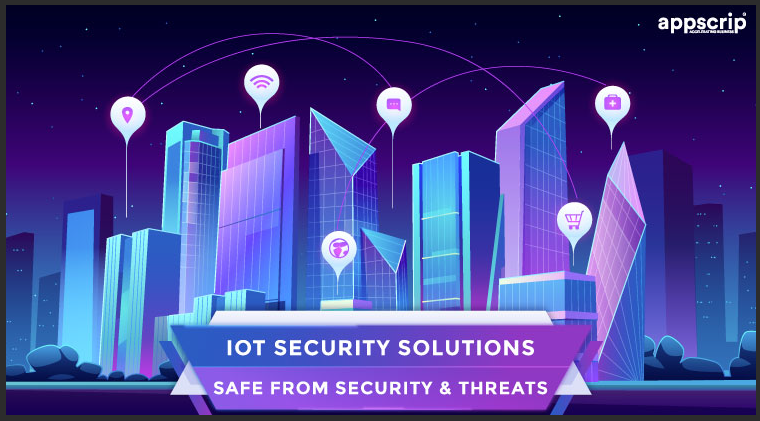Every day, people are inventing new ways to connect devices. The most recent estimates predict as many as 75 billion will be online by 2025.
Securing so many devices—each with its unique manufacturing process, electronics, software, function and lifecycle—requires a uniquely flexible, scalable and trusted iOT security solutions.
From increasing the safety of roads, cars, and homes, to fundamentally improving the way we manufacture and consume products, IoT solutions provide valuable data and insights that will enhance the way we work and live.
Success depends on ensuring the integrity and confidentiality of IoT solutions and data while mitigating cybersecurity risks.
Why IoT Devices Are Vulnerable— And Why You Should Care
What is it that makes IoT devices more vulnerable and attractive to attackers than servers, routers, or other types of endpoint devices? One major factor is the lack of standardization and regulation around IoT security. Moreover, many IoT devices lack the hardware capacity needed to support robust cybersecurity applications. Human error also contributes, amplified by the relative unfamiliarity of IoT technology on behalf of many end-users and operators.
The other consideration is that IoT devices connected to sensitive or critical operations in a corporate, industrial, or security context can represent extremely high-value targets for some bad actors. Attacks by sophisticated and professional cybercriminals bear the potential for highly costly or dangerous consequences.
In addition to the predictable loss of profits and privacy, breaches to IoT devices may land businesses in hot legal waters. California enacted legislation in 2019 that requires “reasonable security features” to be installed in all IoT devices, and the UK has proposed a similar law.
Understanding IoT Security Risks | iOT Security Solutions
Modern IoT ecosystems are complex.
Machines and objects in virtually any industry can be connected and configured to send data over cellular networks to cloud applications and backends.
The digital security risk is present at every step along the IoT journey, and there is a bunch of hackers that would take advantage of a system’s vulnerability.
Unfortunately, diverse data types and computing power among IoT devices mean there’s no ‘one size fits all’ cybersecurity solution that can protect any IoT deployment.
The first step for any IoT business is to undergo a thorough security risk assessment that examines vulnerabilities in devices and network systems and user and customer backend systems.
Risk must be mitigated for the entire IoT lifecycle of the deployment, especially as it scales and expands geographically.
Top 19 IoT Security Solutions
Unique vulnerabilities require different solutions. When it comes to connected Internet of Things devices, protection requires a combination of detection, prevention and mitigation solutions across multiple layers.
We’ve chosen the best providers for IoT network and device security for 2021 to help you build your IoT device security tech stack.
1. Palo Alto Networks
Offices, data centers, and other facilities outfitted with IoT networks can secure their devices against hostile traffic and attempted breaches with Palo Alto Networks’ IoT security solution. It dubbs itself a turn-key package that includes both hardware-based and virtual firewalls, device identification tools, and other tools designed to provide visibility and protection for unmanaged IoT devices.
2. FirstPoint
FirstPoint is uniquely focused on protecting cellular IoT devices from attacks that originate from within the cellular network or that communicate through the cellular network, which it does through a device-agnostic agentless security solution. This helps mobile network operators secure vulnerable cellular-connected devices from the unique threats faced by IoT devices on cellular networks – including private LTE & 5G networks.
3. Trustwave
Trustwave offers managed IoT security that analyzes your network for weak points in connected devices and the servers, APIs, and cloud services that interact with them. This enables network administrators to deploy quick fixes and prepare for potential attacks ahead of time, instead of finding out about vulnerabilities only after a successful breach occurs.
4. Cynerio
Another solution created with healthcare facilities in mind is Cynerio. It protects IoT networks by providing inventory and network visualization tools as well as risk detection that takes into account the specific regulations and architecture of healthcare systems. This flexible solution can protect patient information and other sensitive data against persistent attackers.
Also Read | Top 5 Use Cases Of Elasticsearch In Various Industries
5. Armis
Critical assets in industries like healthcare, utilities, and manufacturing are the focus of Armis’s agentless device security solution. By starting with a complete inventory of connected assets, Armis can then scan all data traffic to and from these devices. Armis processes all this traffic to subsequently identify vulnerabilities, execute automated security policies, and provide continuous monitoring on both managed and unmanaged devices.
6. Bastille
This security solution offers cellular and RF threat remediation by detecting, analyzing, and classifying the devices connected to your network and giving you the tools to take the actions needed to protect yourself. Well-suited to providing device security within a specific and contained location, Bastille makes it easy to enforce no-phone policies and other physical security measures.
7. Atonomi
The Atonomi Network’s IoT security solution is blockchain-based. It works by providing immutable identities for network assets and tracking the reputations of connected devices, ensuring safe and secure transactions across platforms. Atonomi can be used for small-scale applications such as smart cars or homes as well as larger ones like healthcare systems and industrial facilities.
8. CENTRI Protected Sessions
Protected Sessions provides data security for endpoints and gateways across any type of network through a library installed locally on the IoT device. It integrates with all major IoT cloud providers and provides industry-standard encryption to secure your data in transit across private and public networks.
9. Trusted Objects
Trusted Objects creates unique digital identities for devices connected to your IoT cloud network. This allows you to protect those devices against both physical and cyberattacks with a combination of proven technologies and advanced security features.
10. SensorHound
Designed to improve reliability and reduce the operational costs of your IoT system, SensorHound’s suite of products offers automated monitoring for IoT networks and client devices. It traces software failures and intrusions, monitors cloud deployments, and provides forensic diagnostics for every node on your network.
To Conclude
While IoT explosion offers a wide range of opportunities for manufacturer and consumers, it also poses major risks in terms of security.
As more devices get interconnected, securing them all will be the biggest challenge. Hardware, software and connectivity will all need to be secure for IoT objects to work effectively. Without security, any connected object, from refrigerators to manufacturing bots, can be hacked. Once hackers gain control, they can usurp the object’s functionality and steal the user’s digital data.



















